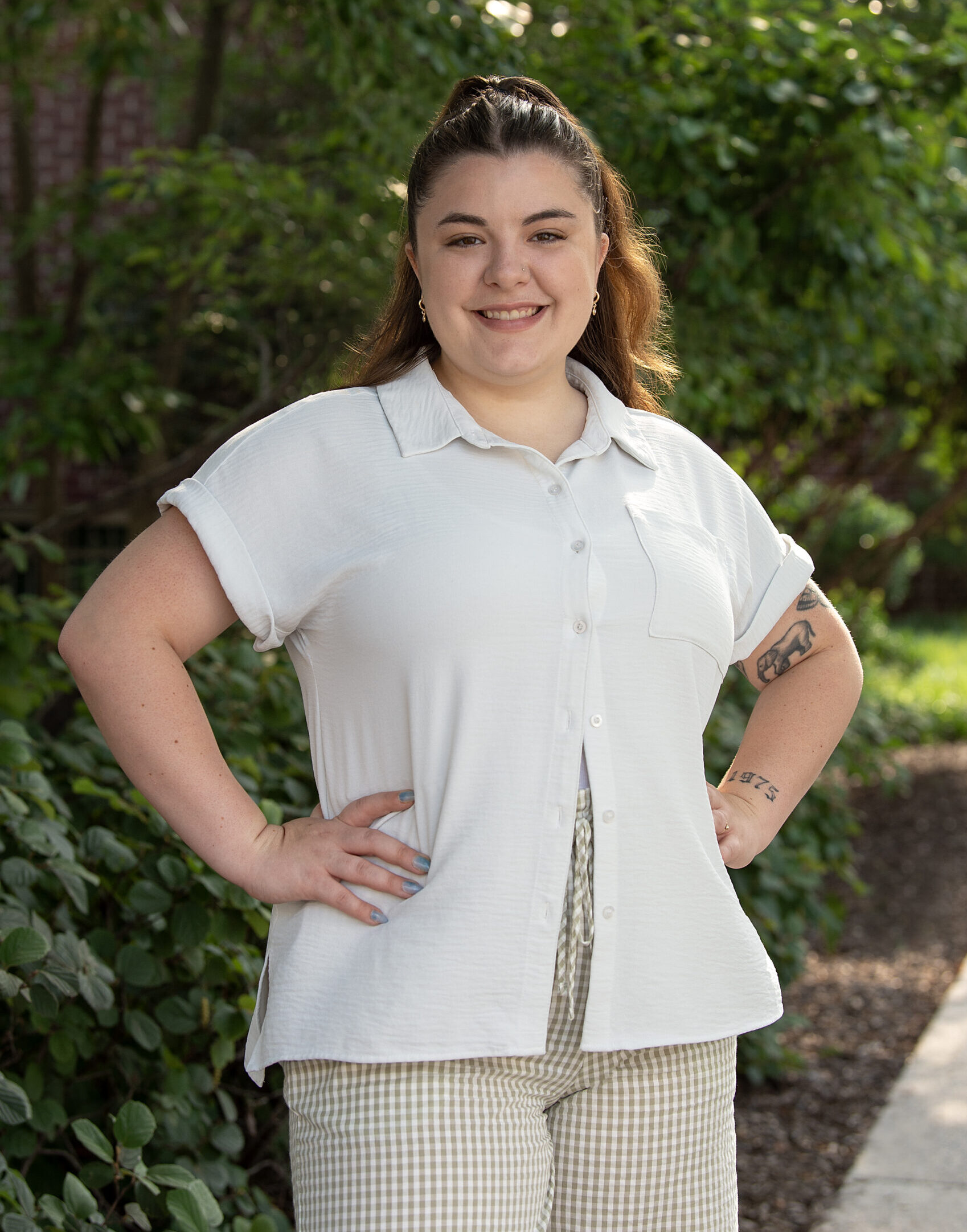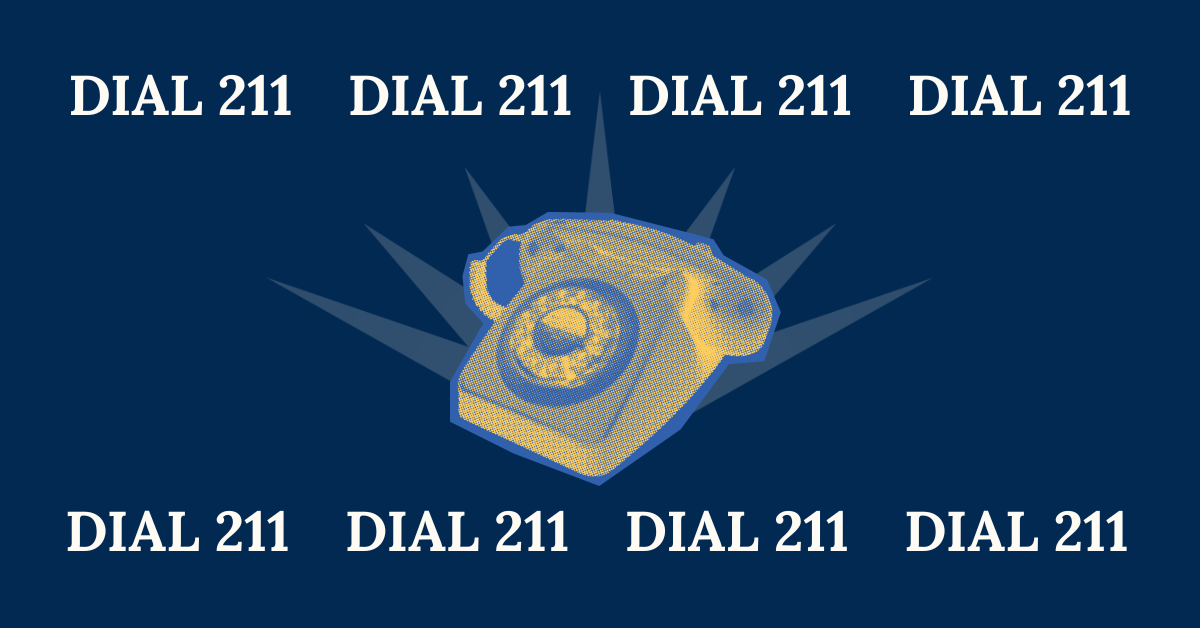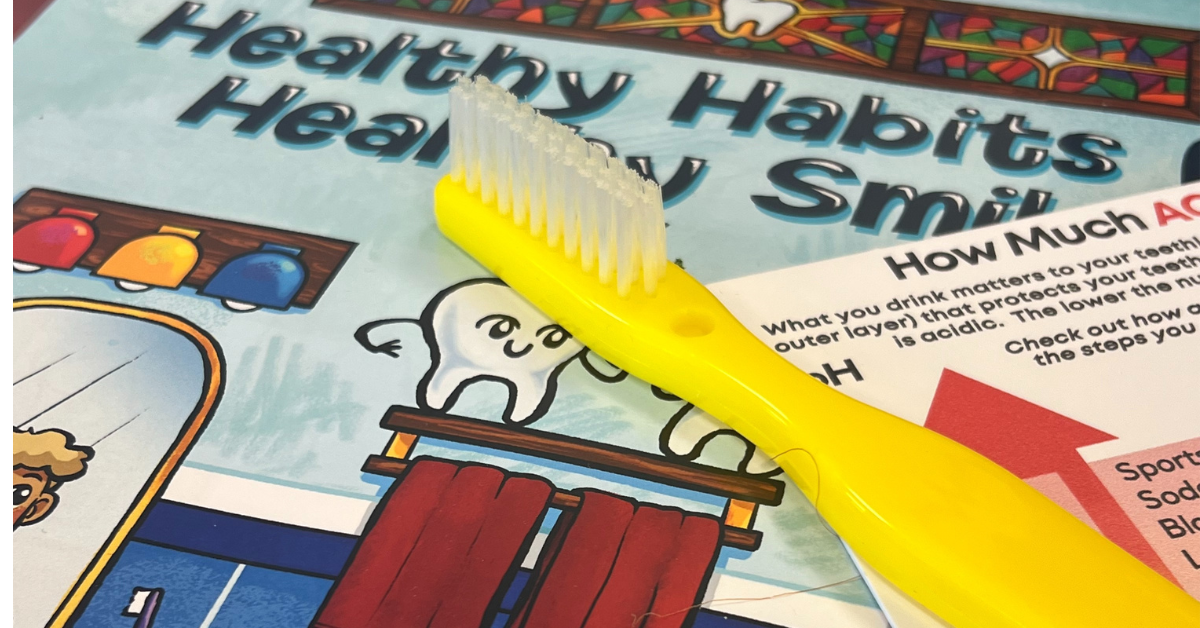Reading, PA (August 25, 2025) – Health and Human Services Program Officer of Berks County Community Foundation, Cindy Milian, gave the keynote speech at the Community Wellness Department of Reading Hospital Tower Health’s “Voices for Health” event. This event launched the Community Wellness Department’s week-long celebration of community health workers. Tanieka Mason, MPH, Director of Health Equity at Tower Health, asked Cindy to address the health needs of Berks County residents, impart her expert knowledge, and provide a testimonial to the vital services our community health workers provide.
Event attendees and speakers included Helping Harvest Fresh Food Bank’s President, Jay Worrall; Reading Hospital President and CEO, Dr. Charles F. Barbera, MD, MBA, MPH, FACEP; Secretary of Human Service of the PA Department of Health, Dr. Valeria Arkoosh, MD, MPH; Executive Deputy Secretary of the PA Department of Health, Kristen Rodack; Senator Judy Schwank; various local health service and pharmaceutical providers, and of course, a cohort of dedicated community health workers who serve Berks County.
According to the Tower Health website, “Reading Hospital’s Community Wellness Department works to identify and address key health issues in the community by leading a variety of programs and initiatives, collaborating with community partners, and investing in the overall health of our community.”
Cindy Milian’s keynote speech for the Community Wellness Department of Reading Hospital Tower Health’s “Voices for Health” event can be found below. Please note that certain photographs and last names of individuals have been omitted to maintain anonymity.
###
“Thank you to the Community Wellness Department of Reading Hospital Tower Health for having me as a speaker for this event.
It is an honor to address esteemed hospital leadership, the stewards and officials of our local community, and of course, the cohort of community health workers present today.
My name is Cindy Milian, and I am the Health and Human Services Program Officer at Berks County Community Foundation. After 25 years of working as an Early Intervention Specialist, Therapeutic Staff Support, Home Health Aide Supervisor, Caseworker, and Casework Supervisor in Pennsylvania, I decided to take a well-deserved break by joining the foundation and overseeing hundreds of grants for individuals, public health initiatives, and human services initiatives.
Before I talk to you about community health, patient advocacy, or social determinants of health, I want to talk about my grandson.
This is Alexander (image omitted). He loves Baby Shark, Reggaeton, and being carried on my husband’s shoulders. If anyone here has a one-year-old child in their lives, then you know that they assert themselves and their needs loudly and with conviction. Alexander is no exception to this—we always know when he’s hungry, or wants Papa, or isn’t feeling well. Being a grandmother to Alexander means witnessing community health initiatives in action; it means fielding a lot of requests for help and hugs; it requires the inspection of the tangible and intangible world around him, and evaluating how it will affect his mental, physical, and spiritual health.
But the real inspection I want to conduct today is on the health of Berks County. My current work with the Community Foundation places me in a position of power and privilege: the power—or burden—of saying no to grant applicants, and the privilege of witnessing the life-changing impacts our donors have on their fellow Berks residents.
With the foundation, I’ve met with Hamburg community leaders who are struggling to identify mental health clinics for their at-risk populations; in Reading, I’ve guided a monolingual, Spanish speaking resident through the process of applying for a grant that could save her child’s life; and all over Berks County,
I’ve talked with countless individuals who are one paycheck away from homelessness. They are our neighbors, our coworkers, our friends. They are the patients we see in our offices, clinics, at-home visits and hospital beds every day.
Before we can talk about community health, we must talk about the community. In 2023, the United Way’s ALICE Report, which stands for Asset Limited, Income Constrained, Employed, showed that over 40% of Berks County households earned less than the county’s basic cost of living. This means that more than 47,000 Berks County working households are one paycheck away from a severe financial crisis, and more than 18,000 households are living in poverty.
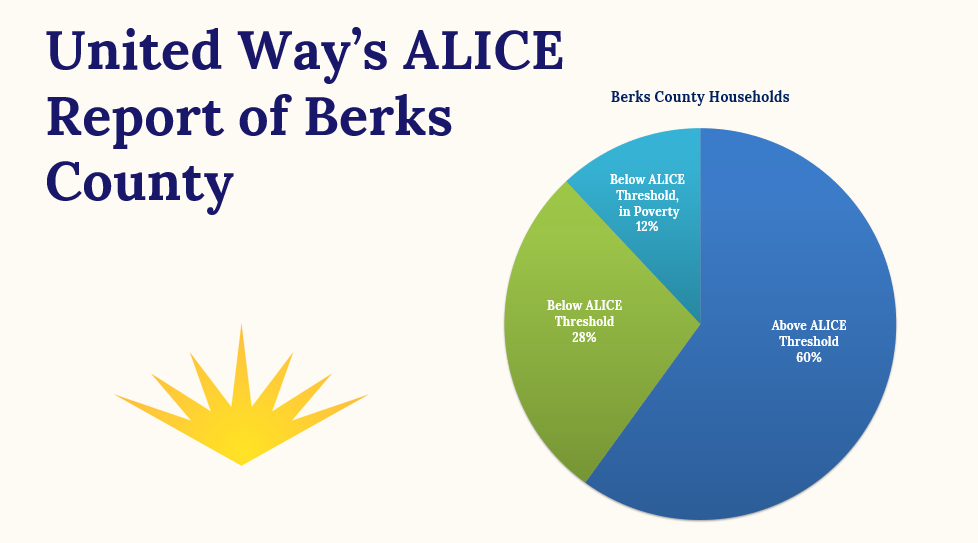
For those 18,000+ households, the cost of a survival budget is unattainable. Meaning 12% of Berks Countians cannot afford the following:
- Housing
- Childcare
- Food
- Transportation
- Health care
- Technology
- Taxes and
- Unanticipated, one-time costs within the other categories.
So, what budget item would you cut to make ends meet? Would you call out from work and miss a paycheck because you couldn’t afford the bus fare? Would you skip a mammogram appointment to pay your rent this month? These aren’t hyperbolic questions designed to scare you – these are questions that tens of thousands of our community members ask themselves every day.
Some people in Berks County might hear these numbers and think, “well, that’s just a City of Reading issue.” This belief is false.
In 2023, the local government released the Study of the Delivery of Health and Public Health Services in Berks County, a comprehensive report that identified four health priorities that are specific to Berks and affect every school district in the county:
- The need to improve access to equitable care, particularly for marginalized populations
- The need to provide behavioral/mental healthcare to both adults and youth
- The need to focus on health education and health literacy, especially resources and information tied to wellness and disease prevention
- The need to address health disparities and increase the focus on health equity
Based on the information provided in this report, I’d like to share with you a story that highlights the need for these improvements. Last names have been omitted to maintain anonymity.

Ms. Susan is a grandmother, just like me. She lives in Boyertown, and, like so many families in our county, has been tasked with the guardianship of her grandson, who was diagnosed with Joubert Syndrome at birth. This genetic disorder affects part of the brain that controls balance and coordination. The disorder requires extensive therapy and services to manage daily living. Missing these appointments can have severe impacts on health – so why would Susan skip them? Ms. Lauren, a community health worker assigned to Susan’s family, noticed a trend of skipped appointments and decided to check in with the family.
Lauren found that Susan’s husband is wheelchair bound and in need of constant care, just like their grandson. Between providing 24/7 care for both her husband and grandson, Susan struggled to manage the paperwork and scheduling necessary for her grandson to attend school and therapy. Lauren discovered that the family didn’t have readily available access to a computer, where most of this paperwork could be found. That’s when Lauren reached out to the foundation.
For less than $200, Jess’s Sunshine Fund provided a laptop for Susan to manage her grandson’s care. The no more missed appointments led to no more unnecessary declines in her grandson’s health. Susan’s grant is one of the smallest distributions made by Jess’s Sunshine Fund, but it was profoundly impactful.
This technological barrier reveals a much larger truth: when we have a dedicated community health worker committed to the recognition, investigation, and improvement of the conditions that people are born, raised, and grow in, we can work together to create a healthier future.
Stories like Susan’s are just one of hundreds that I’ve been a part of at Berks County Community Foundation. Our relationships with community health workers in the county allow us to allocate donor dollars to essential health initiatives.
I’d like to give you another example of how collaboration with a community health worker made a positive impact on a family.
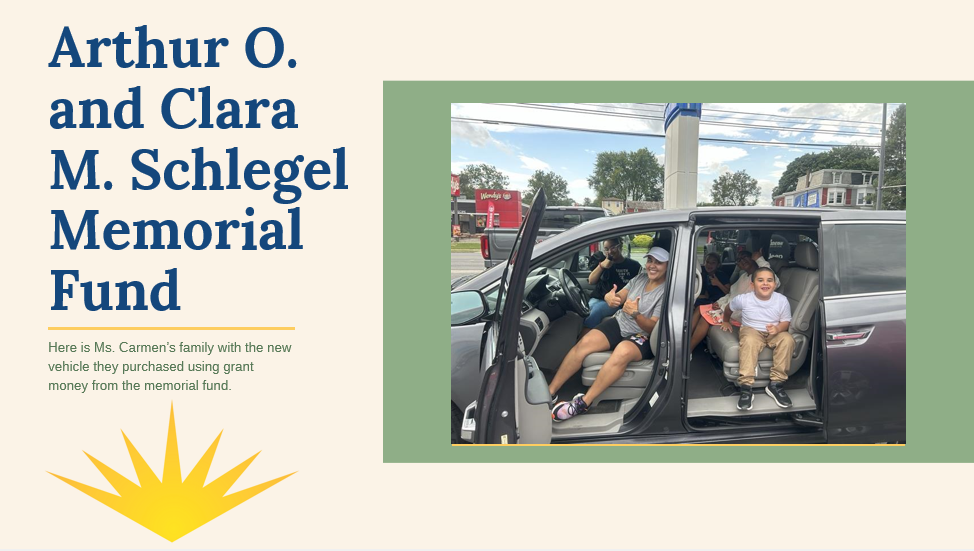
In 2024, a Berks County community health worker, Ms. Bobbi, noticed that Ms. Carmen, whose son has sickle cell anemia and Lowe syndrome, often rescheduled or missed her son’s necessary, recurring appointments in Philadelphia. After talking with Carmen, Bobbi discovered two things: first, Carmen’s car was in constant need of repair and wholly unreliable. Second, Carmen is a single mom, tasked with providing constant care for her son. As a young boy who is blind, non-verbal, and non-ambulatory, Carmen’s son has total dependence on his mother.
With Bobbi’s help and a written letter of recommendation, Carmen applied for our Arthur O. and Clara M. Schlegel Memorial Fund and was awarded the grant money needed to purchase a reliable vehicle. In Carmen’s case, and too often in Berks, non-medical factors impede our community’s health. We’ve all heard the cliché statement of, “I can’t afford to get sick right now.” Right now, it is our job to make a healthy life attainable and affordable for all.
Addressing the social determinants of health in Berks decreases health issues and lessens the burden on our community. Having a community health worker on your care team to identify both non-medical and medical needs is vital to ensuring positive health outcomes.
Berks County is a beautiful, diverse, and complicated region. We speak different languages, experience different life stressors, and hold vastly different beliefs. But our personal health is fundamentally interconnected with our community’s health. We need community health workers in our offices, clinics, hospital rooms, and mobile health services. Now more than ever, for ourselves and for future generations.
In closing, I want to leave you with one final thought. At Berks County Community Foundation, we have a quote on the wall of our boardroom from local philanthropist and industrialist Louis R. Thun; that reads,
“We remind ourselves constantly that we are heirs of an exceptional past, custodians of a challenging present, and architects of a limitless future.”
I believe that together, we can rise to the challenges presented to us today. I believe that we can build a more equitable, healthy, and vivacious Berks County. And to the community health workers of Berks County – thank you. Your work is invaluable and necessary. True change can start with a single spark, and we need yours.
Thank you.”


